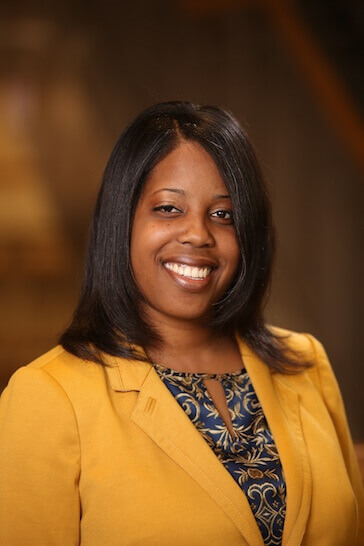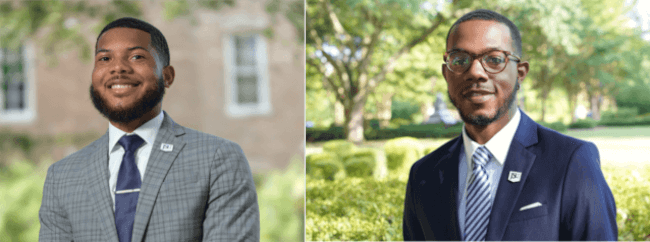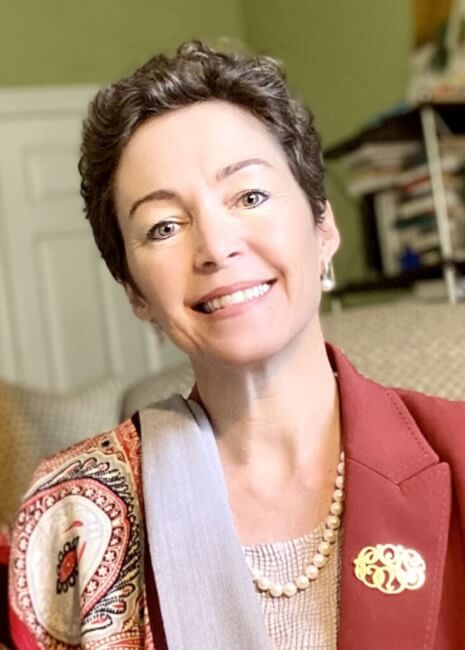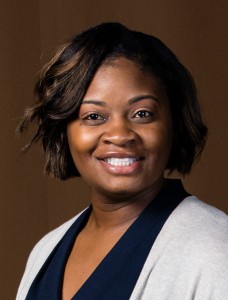
Dr. Alisa Mosley, interim provost and vice president of the Division of Academic Affairs at JSU, has been working diligently to bridge any gaps between administrators, faculty and students during the University’s shift to a hybrid-learning structure. (Photo by Charles A. Smith/JSU)
![]()
Staying ahead of concerns spurred by COVID-19 changes, JSU administrators and students have been holding virtual faculty and student town halls to improve learning and educational instruction for all.
“Our return to campus centered on our desire for students to progress in their studies and complete their degrees. We are learning lessons on improving instruction daily, and we are unafraid of making changes in students’ best interests,” says Dr. Alisa Mosley, interim provost and vice president of Academic Affairs.
This past spring, the university transitioned 80 percent of traditional courses online. Since the fall, JSU has offered a hybrid mix of face-to-face classes and online instruction while keeping recommended safety guidelines intact.
“We are committed to acquiring needed resources for faculty development and student engagement. Our efforts to support students will be recorded in history, and I would want that history to reflect a willingness for us to build community,” said Mosley.
Throughout the fall term, the university has been hosting Zoom sessions with student representatives, faculty and staff to discuss higher-ed experiences, including highlights. The students also give feedback on areas that need adjustment.
“There is a greater responsibility here as well. We are designing instructional systems to affect higher education for the future, and we are teaching students another core competency needed for their career-resiliency. We continue to listen to emails, social media, phone conversations, and survey commentary, ensuring that we have the pulse of student and faculty perceptions,” she said.

Dr. Brandi Newkirk-Turner, interim associate provost for the Division of Academic Affairs, has been helping to facilitate discussions aimed at enhancing the virtual environment at JSU. (Photo by Charles A. Smith/JSU)
For example, explained Dr. Brandi Newkirk-Turner, interim associate provost, the university implemented a midterm course evaluation, where students provide anonymous feedback on their academic experience for each registered course. The information is then reviewed in efforts to enhance student learning for the second semester.
“The evaluation allows faculty to make necessary changes or pivot their approach,” she said. “Because by the end of the semester, it’s too late to address issues.”
The student assessments further allow the university to make needed adjustments and accommodations.
Like issues regarding internet connectivity, professors were able to extend the time allotted for students to take examinations.
Additionally, professors and instructors were encouraged to post recorded lecturers giving students time to process and understand course content.
“So these issues are not impossible to resolve. They are not deal-breakers. Dr. Mosley and others are always looking for solutions. And I really think we’ve been successful is because we’ve been maintaining an open dialogue,” said Newkirk-Turner.
“It’s not something we all did at the beginning of the semester, but it’s something we continued to do. We review Twitter and social media. We look for problems to actively solve, and that’s a difference-maker.”
The survey results, she said, provide evidence “that learning and teaching are going on here.”
Although the pandemic has made life hard for everyone, including faculty, staff and students, Newkirk-Turner said she believes people are doing a good job dealing with an unanticipated situation.

Jacori Daniels, SGA President, (left) and Justin Standifer, president of the College Activities Board, both agree that the townhalls serve to ensure the success of their peers and the university. (Photos by Charles A. Smith/JSU)
Aside from university-sponsored town halls, academic colleges and student organizations have also been hosting individual sessions.

Dr. Candis Pizzetta, dean of the College of Liberal Arts, has been holding townhalls since July, where students have developed creative ways to stay connected to the university. (Photo special to JSU)
The student body held a virtual town hall inviting specific faculty and staff to participate. Jacori Daniels, president of the Student Government Association, said faculty and staff gave updates from their respective departments and then fielded questions during a Q&A session.
“After the town hall, my leadership council and I have meetings with the faculty and staff to see what we can do to resolve the issues discussed in the town hall,” said the biology pre-med major. “The process has been beneficial during this school year as we all work together to have a productive year.”
Justin Standifer, president of the College Activities Board, shared that some issues are fixed the same day, which makes a big difference.
He agrees that the platform allows for a better academic experience. “In some cases, there are professors who have extreme course content, and the virtual environment is new for all of us. So, it’s imperative that we tackle these issues early on so we don’t have to deal with these things in the upcoming semester.”
Dr. Candis Pizzetta, dean of the College of Liberal Arts, shared that the CoLA began hosting town halls in July so that students could ask about plans for the fall semester.
“We see this group of student leaders and the town halls as a way to create a consistent dialogue about current issues, students’ needs, and future directions for the college,” said Pizzetta. “Of course, we started the town halls to increase a sense of connection with students, but the town halls have given us much more insight into how to improve the overall student experience.”

Dr. Whitney Perkins serves as the undergraduate program coordinator for the Department of Communicative Disorders. Her “Tea with the UPC” is proving to be popular with her students. (Photo special to JSU)
From those meetings, a student advisory committee emerged. Right now, shared Pizzetta, the advisory committee is working on plans for a student-led podcast about the HBCU experience.
“We began by trying to connect the students to JSU, but they have taken it a step further, aiming to create their own virtual environment to inhabit while they are still away from campus. I’d definitely say we learned a good bit about how resourceful and resilient our students are,” she said.
The Department of Communicative Disorders holds a “Tea with UPC,” where students meet with Dr. Whitney Perkins, undergraduate program coordinator.
“It originated as a simple idea I had to help connect and engage with my students during these virtual times,” said Perkins. “I had to be innovative in my thinking of ways to fully engage my students during the current climate.”
The virtual meetings have allowed students in the department to discuss academics, their social and emotional well-being, graduation requirements, and course concerns, among other various topics.
“It is very important, as a student, to connect with faculty within their respective departments. By connecting with faculty, students gain first-hand knowledge of various opportunities within the department and the field of communicative disorders,” said Perkins. “I love getting to know my students and developing long-lasting professional relationships with them.”
Perkins said the platform allows her to offer students additional resources, strategies and tips on how to study and clarify any course-related miscommunications.
Additional resources and programs for students include NET Tutoring, DuBois-Harvey Honors College peer tutoring, and an Academic IT device loaner program.
As for faculty assistance with navigating a virtual environment, Newkirk-Turner shared that as skills are retooled faculties are offered regular training sessions.
“Provost Mosley has a schedule of very intensive trainings that focus on universal design for learning. We will start those trainings at the end of the semester. Over our break, she’ll be bringing in consultants and experts to gear us up for a successful spring semester,” she said.







